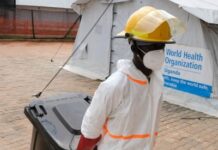Speaking from Gaza, WHO Representative Rik Peeperkorn described a scene of widespread destruction, overwhelmed medical facilities and growing mental health needs, as the population in the enclave gradually returns to what is left of their homes after nearly 16 months of conflict.
Critical infrastructure, including electricity networks, has suffered extensive damage across the Gaza Strip.
Wider humanitarian situation
Beyond the dire health crisis, the broader humanitarian situation in Gaza remains critical, with severe shortages of clean water, food, and essential services.
UN Emergency Relief Coordinator Tom Fletcher visited the enclave on Thursday, as UN agencies and partners continue responding to immense needs, a UN spokesperson said.
“In northern Gaza, Mr. Fletcher toured two hospitals – Al Shifa in Gaza City and Al Awda in Jabalya – where he met with patients, staff and management,” Farhan Haq, Deputy UN Spokesperson, told journalists at a news briefing in New York.
“Leaving the Al Awda hospital, he spoke with survivors and returnees in Jabalya who are trying to rebuild their lives amid the rubble.”
Acute shortages
Mr. Haq further reported that water shortages remain particularly acute. The only operational water well in north Gaza, run by the UN Relief and Works Agency (UNRWA), serves as a crucial lifeline for clean drinking water.
However, widespread infrastructure destruction has left many residents without reliable access. Humanitarian partners are distributing 2,500 cubic metres of safe drinking water daily, reaching about 411,000 people, but this remains far below the actual needs.
A partner organization is also providing cleaning and sanitation services at 17 displacement sites in northern Gaza, benefiting nearly 12,000 displaced individuals.
“Water, sanitation and hygiene partners are carrying out assessments in locations across the Strip to repair water wells, install dosing pumps, and set up water filling points,” Mr. Haq said, adding: “while some repairs are already underway, further progress hinges on teams being able to clear debris and carry out assessments of explosive hazards.”
Challenges in the West Bank
Meanwhile in the West Bank, Israeli military operations have intensified in Jenin, Tulkarm, and Tubas, severely restricting Palestinian access to essential aid, including water, food, medicine and supplies for infants.
In Tubas governorate, Israeli forces have been operating in the El Far’a refugee camp for five consecutive days, Mr. Haq reported.
“They have imposed a curfew, reportedly prohibiting residents from leaving their homes. They also bulldozed roads and damaged water networks, forcing residents to rely on collecting rainwater.”






























